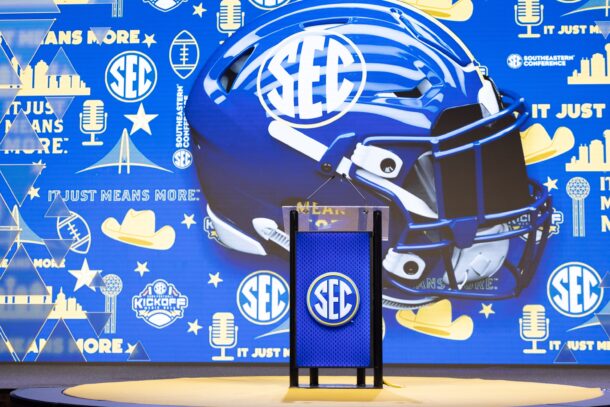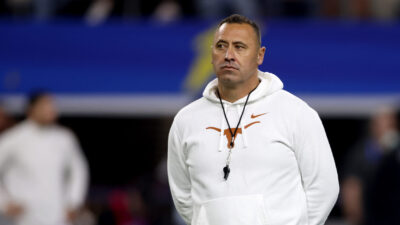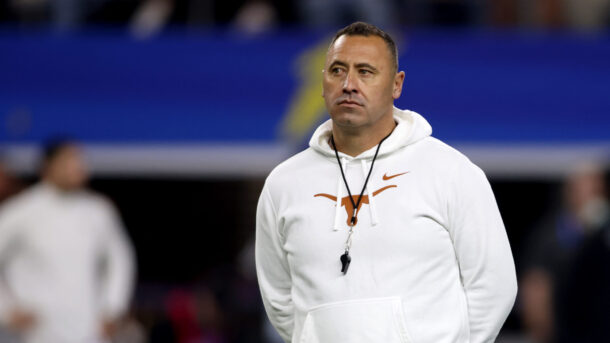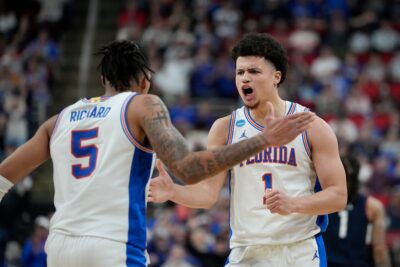Ad Disclosure

O’Gara: Tennessee vs. Texas A&M — 5 things that’ll determine who wins the 2024 College World Series
No matter what, history is on the horizon.
Neither Texas A&M nor Tennessee has won the College World Series. You know, in case you haven’t heard.
We’re also about to see the SEC have its 5th different team in 5 times win a national title. That’s the most consecutive national titles by 1 conference, and the fact that it’ll be 5 unique winners is history in itself.
So what will decide the SEC Invitational? Or rather, the CWS Finals?
These 5 things as we await Saturday night’s first pitch in the best-of-3 title series:
1. Christian Moore being Christian Moore
Hey, I didn’t say that these had to be “under the radar” things. It’s obvious that Moore playing like the All-American he is will be pivotal for the Vols, who reached the CWS Finals thanks in large part to his 8-for-14 start in Omaha. Oh, and he became the second player ever to record a CWS cycle. You know this.
You also know that Moore had a nightmare showing in the Vols’ only postseason loss against Evansville in the Super Regional. Moore had a chance to be the hero that day but instead flew out to end the game in what was a hitless day. That’s the only such occurrence since the start of the Super Regional. On days when the Tennessee leadoff hitter has multiple hits, the Vols are 30-5. That’s not a coincidence. It’s also not a coincidence that the aforementioned cycle helped Tennessee overcome that mistake-filled CWS opener against Florida State.
There aren’t a ton of hitters on the planet who can take over a game. Moore is on that short list.
2. A&M’s pitching continues to be lights out in Omaha
Again, this isn’t breaking news. You can’t ask for much more than what A&M’s pitching staff has done so far. A&M allowed an average of 1 earned run per game in 3 College World Series victories. Yeah, that’ll play. They’ve been comfortable pitching out of jams because they have several hurlers with swing-and-miss stuff. So far, they averaged 12 strikeouts per CWS contest.
Related: Looking to stay on top of all the College World Series action? SDS has you covered with its CWS homepage!
The team with the No. 3 ERA in Division I would love to continue to get the ball to All-SEC closer Evan Aschenbeck with a lead. The nation’s leader in ERA has just 1 earned run allowed since the start of June. It helped that A&M had a 5-run inning against Kentucky to save Aschenbeck for the semifinal, where he helped shut the door on Florida. More important, Ryan Prager held the Cats’ offense in check for 6 2/3 innings. A&M’s starting pitching has thrown 14 2/3 innings without allowing a run while only surrendering 8 hits in Omaha.
It doesn’t take a baseball nerd to say if that continues, the Aggies will upend the top-seeded Vols.
3. If Tennessee starts leaving the yard — even solo blasts — that’s a bad sign for A&M
After Tennessee blasted 3 home runs in the first inning of Game 2 in the Super Regional, they flashed a stat that the Vols were 29-0 when hitting 3 home runs in a game. Of course, that ended up being the Vols’ lone loss of the postseason. The next day, they clubbed 7 bombs en route to punching their ticket to Omaha. Now, that number is 30-1 when Tennessee hits at least 3 solo home runs in a game.
The question for Tennessee, which has hit 178 home runs (the most since 1997 LSU mashed 188), was whether that would carry into Omaha and if they’d be too long-ball dependent. The Vols have hit 5 home runs in 3 games, a notch below their norm of 2.66 HRs per game entering the CWS. That’s a credit to how balanced Tony Vitello’s squad is.
But against a staff that’s been so remarkable like A&M having allowed an average of just 5 hits per game in Omaha, it feels like the big fly will be pivotal for the Vols, who have homered in 14 consecutive games. There might not be a meltdown inning where a pitcher loses command and everything is catching the barrel of those Tennessee bats. Capitalizing on those rare A&M mistakes will be important for Moore, Blake Burke and the rest of the potent Vols’ attack.
4. A&M’s patience at the plate
I thought Game 2 against Oregon in the Super Regional was such a pivotal point for the Aggies’ postseason run. A&M was in somewhat unfamiliar territory just by trailing at Blue Bell Park, where they had only lost 3 games all season. Down 8-4 and already without injured star Braden Montgomery, it would’ve been easy to try and have guys step up to the plate and get it all back with 1 swing. Instead, the A&M lineup recognized that Oregon pitcher Brock Moore was unraveling and offering free bases to anyone who stepped to the plate. That set up that all-important grand slam from Kaeden Kent to bust things open for good.
Kaeden Kent launches a grand slam and College Station is rocking!pic.twitter.com/NHcpZ7eJYQ
— Stephen Schoch (@bigdonkey47) June 10, 2024
It’s no surprise that A&M leads the country in walks. It’s also no surprise that the last time the Aggies took less than 5 walks in a game was, fittingly, the last time they lost. It was a 7-4 SEC Tournament defeat to … Tennessee. The Vols haven’t been known to give out many free passes, which is why they’re No. 3 in America in strikeout-to-walk ratio at 3.3 (A&M is 1 spot behind at 3.27). That’s also why they got into so much trouble against Florida State — some costly defensive mistakes didn’t help — in the opener when the Seminoles took 9 walks.
A&M’s ability to get ahead in counts, drive up pitch counts and take the occasional free base could sway the best-of-3 series.
5. If there’s a Game 3, will we see Zander Sechrist start on short rest? And if so, will he continue to dominate?
I don’t necessarily feel comfortable comparing anyone to Paul Skenes, but remember last year when all the intrigue centered on whether the LSU superstar would be available in Game 3 of the CWS Finals? It’s a somewhat similar situation that Vitello will face with Sechrist, who has been nails for the Vols in the past month:
- 5 starts
- At least 6 IP in 4 of 5 starts
- 0 earned runs in 3 of 5 starts
- 4 total earned runs in 29 1/3 innings
- 5 victories
With Skenes, he had 3 days of rest going into Game 3. Jay Johnson made the gutsy move not to start him and it paid off. Thatcher Hurd was in control and LSU’s offense dominated, which meant that well-documented dilemma was all for naught as LSU celebrated a national championship. With Sechrist, he would be working on 4 days of rest going into a potential Game 3. Mind you, he just started with 9 days’ rest and locked in a quality start with 76 pitches, so perhaps that could help Sechrist’s case. Knowing how competitive the southpaw is, it’s safe to say he’ll want the ball with the season potentially on the line.
Vitello turned to Sechrist to clinch a Regional title, a Super Regional title, as well as the Vols’ first trip to the CWS Finals since 1951. Something tells me there’s a strong chance that Vitello will do the same if a Game 3 awaits.
Connor O'Gara is the senior national columnist for Saturday Down South. He's a member of the Football Writers Association of America. After spending his entire life living in B1G country, he moved to the South in 2015.




